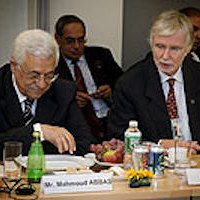![]()
Tue, Dec 6, 2011 | Rubin Reports | By Barry Rubin

Voting was slow in Cairo, Alexandria and Port Said as the run-offs began on Monday, in contrast to the crowds at polling stations last week. (Al-Arabiya/Reuters)
Egypt: We’ve Heard What the Majority Thinks
BIALYSTOCK: “Maybe it’s not true!”
BLOOM: (mumbling): “No way out. No way out.”
BIALYSTOCK: “Why don’t we go over to the theatre and see what’s really happening? After all, we’ve only heard from a small portion of the audience. Let’s hear what the majority thinks.”
BLOOM (in a trance): “The majority. The majority. Yes. Let’s hear from the majority.”
— The Producers (1968)
What should be clear to the Brotherhood … is that most Egyptians have no interest in swapping Mubarak’s secular dictatorship for a religious one. — New York Times editorial, December 2011
Let’s figure out what the voting in Egypt means in concrete terms. What we have so far are these results for one-third — the most liberal one-third! — of Egypt:
Muslim Brotherhood — 37 percent
Al-Nour (Salafist) — 25 percent
Egyptian bloc (mainly the Free Egyptians Party) — 14 percent
Wafd (liberal, but willing to work with Brotherhood) — 8 percent
Al-Wast (moderate Muslim party) — 4 percent
The remaining votes went to small parties. (Here is a remarkable set of graphs analyzing the first round of the election.)
Most importantly, 112 seats in the lower house of parliament — between 20 and 25 percent of the total seats — were distributed as follows:
Muslim Brotherhood — 46
Al-Nour (Salafist) — 28
Egyptian bloc — 16
Wafd — 8
al-Wasat — 5
other — 9
First: let’s note that these elections will include a second round for unresolved races for parliament’s lower house, voting for the upper house, and will continue until March. But there is no reason to believe that future rounds will be different. Indeed, the Islamists might do even better.
Basically, nationalism has collapsed completely. Liberalism is weak. Moderate Muslims are few. Radical Islamism is the only game in town. Remember that: no alternative exists to an extremist, repressive, anti-Western, anti-Jewish, anti-Christian ideology.
Thank you, President Obama and the New York Times!
Second: the third largest party is the Egyptian bloc, which consists mainly of the Free Egyptians Party along with smaller leftist and liberal parties. Much of its vote comes from Christians, meaning that the proportion of Egyptian Muslims who voted for Islamist parties is even higher than it appears, perhaps 80 percent by the end of the elections.
Where, you might ask, is the vaunted Facebook kids’ Justice Party? Or the supposed leader of the reformists, touted by the U.S. government as Egypt’s future leader, Muhammad ElBaradei?
Answer: Nowhere.
Note that the Wafd, Egyptian bloc, and most of the “other” seats went to moderate and leftist parties. If these parties had worked together, they would have done far better, but their divisions weakened them and will continue to do so in the future. I wouldn’t be at all surprised if the Brotherhood someday forms a majority from an alliance with the Wafd and other tiny parties, thus allowing the Brotherhood to claim moderation by not partnering with the Salafists. (Remember, you heard it here first.)
Third: these votes reflect the most liberal part of Egypt! The Islamists generally, and al-Nour proportionately, will do even better in Upper Egypt (the south).
According to a reporter in Cairo, in Fayyoum’s first district the Muslim Brotherhood received 200,000 and the Salafists 130,000 out of 445,000 votes cast. The Egyptian Bloc received less than 10,000.
In Kafr El Sheikh’s first district, out of 700,000 votes cast the Muslim Brotherhood received 210,000 and the Salafists 275,000. This is the kind of tally we can expect to see in the countryside.
Fourth, an essential point: Egypt is not a parliamentary system, but a presidential one. There will be no coalition to get a majority in parliament and choose a prime minister. Therefore, the Muslim Brotherhood and al-Nour do not need to become direct partners, but only to vote together on specific measures and on electing those who will draw up a constitution.
Thus, the Brotherhood’s denial that it will form a coalition with al-Nour is meaningless.
Fifth: the Western mainstream media is totally out of touch with reality. Many Western journalists and prestigious newspapers insist that the Egyptian people don’t want an Islamist state. Of course they do! We are seeing the democratic election of a dictatorship.
Still: I believe the Brotherhood will be cautious. It doesn’t want to scare people at home and internationally (it wants foreign aid and investment). Not especially wise people will conclude that the Brotherhood wants to be moderate because it doesn’t want to join up with the Salafists. No — it just doesn’t want to share power.
Many of the al-Nour do come from the Brotherhood, and participated in groups during the 1990s that first did community organizing and then moved into violent activities. Many of their leaders were in prison, where they renounced violence. But they are also the kind of people who might return to violence.
Let’s remember that their case against violence was merely that it was ineffective. Now, it might well be effective.
If you are a secularist, a “modern woman,” or a Christian, it’s probably time to get in line at some foreign embassy for a visa. Today, people may think that is an alarmist statement. In a year everyone will know it to be true. I already know people who have left the country.
By the time the election is finished, there should be an easy two-third’s majority for an Islamist constitution.
Of course, all eyes will then turn to the presidential election which should take place in June or not too long afterward. There is an increasing likelihood — I’m tempted to say a certainty — that the Brotherhood will win. In the first round, al-Nour might take away too many votes to gain a majority, but presumably al-Nour would support the Brotherhood candidate in the second round. Oh, wait: perhaps the two second-round candidates will be from the Brotherhood and from al-Nour.
Then, with a two-thirds majority in parliament and a president from the Brotherhood, the true anti-fun will begin.
If Western governments have any brains whatsoever they better start preparing for that moment and they better assume the resulting regime will not be friendly. That means worries of war for Israel (will the Obama administration stop blaming Israel and start supporting it?); lots of fleeing refugees from Egypt; the formation of an Egypt-Tunisia-Libya-Hamas (Gaza Strip) alliance; and Egyptian support for revolution in Syria and Jordan.
In other words, we are back to the wild 1952-1970 era of regional subversion, anti-Westernism, instability, and Arab-Israeli conflict, except for the substitution of Islamism for Gamal Abd al-Nasser’s Arab nationalism.
Forget about this bloc working with the Iran-Syria-Lebanon bloc — the two are enemies. Of course, these divisions coincide with the Sunni-Shia lines. That puts Iraq on the Shia side, but I don’t think Iraq is going to become a satellite of Iran and it will try to avoid regional entanglements.
And of course Israel, along with Jordan, Saudi Arabia, and four Gulf emirates (United Arab Emirates, Kuwait, Oman, and Bahrain) are out in the cold. They are the only friends the United States has left — and they don’t think the Obama administration is much of a friend.
How does the Palestinian Authority fit into this? Good question. They aren’t Islamists, and so must tremble in fear that both Islamist blocs will be out to get them. Certainly, the Sunnis will support Hamas. Thus, the very last thing the PA will want to do is to negotiate seriously or to make a peace agreement with Israel. This is a simple and obvious point, yet one that Western governments don’t seem to comprehend.
Returning to Egypt, let’s not forget the economic factor. The Brotherhood is smart enough to know that it isn’t a good idea to scare people, especially since they are going to be asking for a lot of aid and loans that they aren’t going to be paying back.
If you think an Islamist regime in Egypt supported by the Obama administration is strange, how about an Islamist regime in Egypt subsidized (albeit all too inadequately) by the Obama administration? Well, the president likes things green, so I guess Islamism fits in there.
It is astonishing to see how eager people are to argue that the Muslim Brotherhood and Salafist landslide in Egypt doesn’t really pose any big problems.
Then there’s the democracy fallacy, as expressed by Secretary of State Hillary Clinton:
Transitions require fair and inclusive elections, but they also demand the embrace of democratic norms and rules. We expect all democratic actors to uphold universal human rights, including women’s rights, to allow free religious practice.
Let me try to explain it this way: Democratic norms are merely forms; the content is something else. Is there any chance that the Muslim Brotherhood and Salafists are not going to impose Islamic law on marriage, divorce, inheritance, dress codes, etc.? Of course not. Then what does Clinton expect is going to happen? We know what is going to happen.
Regarding “free religious practice,” the Islamists will accept that in principle. In practice, though, Christians will not be able to build and repair churches. Schools will teach anti-Christian doctrine. Christians will be periodically attacked and murdered without the authorities arresting or prosecuting those responsible (as also happened in the Mubarak era, without U.S. complaints).
Will Clinton and Obama then denounce the Islamists as not being “democratic actors” and condemn them? Of course not. They haven’t really done that in Iran or the Gaza Strip. Thus, Clinton’s statement is pure window dressing, or should I say parsley to garnish a bad policy.
What we have here then is a three-stage strategy:
- Argue that the Islamists are not really a problem but can be moderate in power.
- Welcome their taking power, but “warn” them not to behave precisely the way we all know they are going to behave.
- When they behave that way, don’t complain or do anything about it.



 RSS
RSS










Egypt: We’ve Heard What the Majority Thinks | Middle East, Israel, Arab World, Southwest Asia, Maghr http://t.co/4lqHAZU7
Egypt: We’ve Heard What the Majority Thinks | Middle East, Israel, Arab World, Southwest Asia, Maghr http://t.co/4lqHAZU7